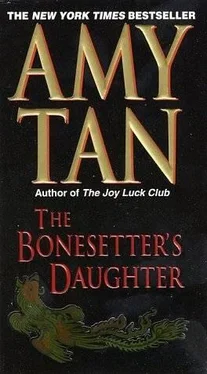"Darling," Agapi said, "why does it always have to be a list of five and ten? I can't always limit myself to such regular numbers."
"It's just easier for people to remember in series of fives and tens," Ruth answered. "I read a study somewhere about that." Hadn't she? "It probably has to do with counting on our fingers."
"That makes perfect sense, my dear! I knew there was a reason."
After they hung up, Ruth began work on a chapter titled "No Child Is an Island." She replayed a tape of Agapi and herself talking:
"…A parent, intentionally or not, imposes a cosmology on the little child-" Agapi paused. "You want to say something?" What cue had she given that let Agapi know she wanted to add a thought? Ruth seldom interrupted people.
"We should define 'cosmology' here," she heard herself say, "perhaps in a sidebar. We don't want people to think we 're talking about cosmetics or astrology."
"Yes, yes, excellent point, my dear. Cosmology, let's see… what we believe, subconsciously, implicitly, or both, how the universe works-you want to add something?"
"Readers will think we mean planets or the Big Bang theory."
"You are such a cynic! All right, you write the definition, but just include something about how each of us fits into our families, society, the communities we come into contact with. Talk about those various roles, as well as how we believe we got them-whether it's destiny, fate, luck, chance, self-determination, et cetera, et cetera. Oh, and Ruth, darling, make it sound sexy and easy to grasp."
"No problem."
"All right, so we assume everyone understands cosmology. We go on to say that parents pass along this cosmology to children through their behaviors, their reactions to daily events, often mundane- You look puzzled."
"Examples of mundane."
"Mealtime, for instance. Perhaps dinner always happens at six and Mom is an elaborate planner, dinner is a ritual, but nothing happens, no talk, unless it's argument. Or meals are eaten catch-as-catch-can. With just these contrasts, the child might grow up thinking either that day and night are predictable, though not always pleasant, or that the world is chaotic, frantic, or freely evolving. Some children do beautifully, no matter what the early influences. Whereas others grow up into great big adults who require a lifetime of very, very expensive psychotherapy."
Ruth listened to their laughter on the tape. She had never gone into therapy, as Wendy had. She worked with too many therapists, saw that they were human, full of foibles, in need of help themselves. And while Wendy thought it worthwhile to know that a professional was dedicated to her and her alone for two one-hour sessions a week, Ruth could not justify spending a hundred fifty dollars an hour to listen to herself talk. Wendy often said Ruth should see a shrink about her compulsion with number counting. To Ruth, however, the counting was practical, not compulsive; it had to do with remembering things, not warding off some superstitious nonsense.
"Ruth, darling," Agapi's taped voice continued, "can you look at the folder marked 'Fascinating Case Studies' and pick out suitable ones for this chapter?"
"Okay. And I was thinking, how about including a section on the cosmology imparted by television as artificial caregiver? Just a suggestion, since it would probably also work as an angle for television shows and radio interviews."
"Yes, yes, wonderful! What shows do you think we should do?"
"Well, starting with the fifties, you know, Howdy Doody, The Mickey Mouse Club, all the way to The Simpsons and South Park -"
"No, dear, I mean what shows I might be on. Sixty Minutes, Today, Charlie Rose -oh, I would love to be on that show, that man is so sexy…"
Ruth took notes and started an outline. No doubt Agapi would call her that night to discuss what she had written. Ruth suspected she was the only writer in the business who believed a deadline was an actual date.
Her watch sounded at eleven. She tapped her finger, Eight, call Gideon. When she reached him, she began with the demands of the Internet Spirituality author. "Ted wants me to push everything else aside and make his project top priority under rush deadlines. I was very firm about saying I couldn't do that, and he hinted pretty strongly that he might replace me with another writer. Frankly, I'd be relieved if he fired me," Ruth said. She was preparing herself for rejection.
"He never will," Gideon replied. "You'll cave in, you always do. You'll probably be calling HarperSanFrancisco by the end of the week, persuading them to change the schedule."
"What makes you say that?"
"Face it, sweetheart, you're accommodating. Willing to bend over backward. And you have this knack for making even the dickheads believe they're the best at what they do."
"Watch it," Ruth said. "That's a hooker you're describing."
"It's true. You're a dream when it comes to collaboration," Gideon went on. "You listen as the clients blather on, egos unchecked. They walk all over you, and you just take it. You're easy."
Why wasn't Art hearing this? Ruth wanted to gloat: See, others don't think I'm difficult. Then she realized Gideon was saying she was a pushover. She wasn't really, she reasoned. She knew her limits, but she wasn't the type to get into a conflict over things that were ultimately not that important. She didn't understand people who thrived on argument and being right all the time. Her mother was that way, and what did that get her? Nothing but unhappiness, dissatisfaction, and anger. According to her mother's cosmology, the world was against her and no one could change this, because this was a curse.
But the way Ruth saw it, LuLing got into fights mainly because of her poor English. She didn't understand others, or they didn't understand her. Ruth used to feel she was the one who suffered because of that. The irony was, her mother was actually proud she had taught herself English, the choppy talk she had acquired in China and Hong Kong. And since immigrating to the United States fifty years before, she had not improved either her pronunciation or her vocabulary. Yet her sister, GaoLing, had come to the States around the same time, and her English was nearly perfect. She could talk about the difference between crinoline and organza, name the specific trees she liked: oak, maple, gingko, pine. To LuLing, cloth was classified as "cost too much," "too slippery," "scratchy skin," and "last long time." And there were only two kinds of trees: "shady" and "drop leaf all the time." Her mother couldn't even say Ruth's name right. It used to mortify Ruth when she shouted for her up and down the block. "Lootie! Lootie!" Why had her mother chosen a name with sounds she couldn't pronounce?
But this was the worst part: Being the only child of a widow, Ruth had always been forced to serve as LuLing's mouthpiece. By the time she was ten, Ruth was the English-speaking "Mrs. LuLing Young" on the telephone, the one who made appointments for the doctor, who wrote letters to the bank. Once she even had to compose a humiliating letter to the minister.
"Lootie give me so much trouble," LuLing dictated, as if Ruth were invisible, "maybe I send her go Taiwan, school for bad children. What you think?"
Ruth revised that to: "Perhaps Ruth might attend a finishing school in Taiwan where she can learn the manners and customs of a young lady. What is your opinion?"
In an odd way, she now thought, her mother was the one who had taught her to become a book doctor. Ruth had to make life better by revising it.
At three-ten, Ruth finished paying the plumber. Art had never come home, nor had he called. A whole new water heater was needed, not just a replacement part. And because of the leak, the plumber had had to shut off the electricity to the entire flat until he had suctioned out the standing water and removed the old tank. Ruth had been unable to work.
Читать дальше












